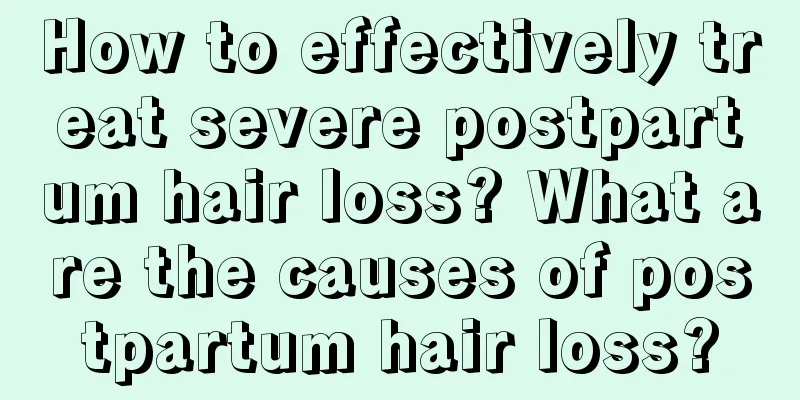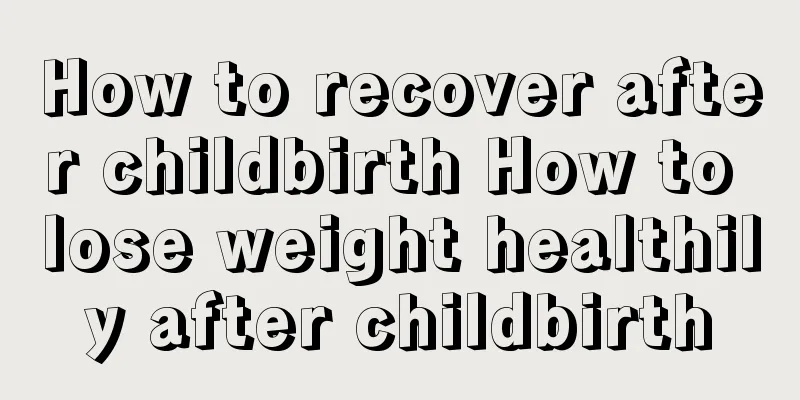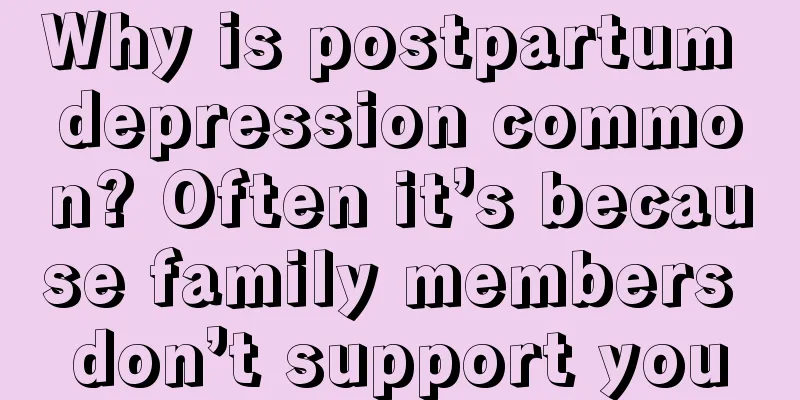How to effectively treat severe postpartum hair loss? What are the causes of postpartum hair loss?

|
Many pregnant women will experience various physical conditions after giving birth. Pregnant women with different physical conditions will also experience different conditions. Some pregnant women will experience severe hair loss after giving birth. So how to effectively treat severe postpartum hair loss? What are the causes of postpartum hair loss? How to effectively treat severe postpartum hair lossPostpartum hair loss is a manifestation of telogen effluvium and a physiological phenomenon. There are many reasons for postpartum hair loss, which are often related to malnutrition during pregnancy, bleeding during delivery, postpartum breastfeeding, mental factors, etc. It is recommended not to be overly nervous, pay attention to reasonable nutrition and personal hygiene, which can effectively reduce hair loss. With the gradual recovery of the body's endocrine level after delivery, most postpartum hair loss can recover on its own within half a year. Severe postpartum hair loss is usually caused by weak qi and blood. You can take qi and blood-tonifying drugs under the guidance of a doctor for conditioning. As long as the qi and blood are sufficient, the situation of postpartum hair loss will also improve. It is also necessary to strengthen dietary nutrition, eat more qi and blood-tonifying foods, such as jujube, longan, etc., and increase the intake of protein and vitamins to enhance the body's resistance and improve hair loss. What are the causes of postpartum hair loss?1. Fluctuation of hormone levels. The level of hormones in the body will directly affect the speed of hair replacement. If estrogen increases, the speed of hair loss will slow down. If estrogen decreases, hair loss will accelerate. During pregnancy, the mother secretes more estrogen than usual, so the speed of hair loss is also slower. But after giving birth, the estrogen level in the body suddenly drops, and the hair begins to fall out. 2. Severe mood swings. A person's mood and hair are closely related. If the mother is emotionally unstable and under too much pressure, the cerebral cortex will malfunction, which will cause the nerves that control the scalp blood vessels to malfunction, reducing the blood supply to the scalp, which will lead to malnutrition and hair loss. Therefore, mothers should maintain a happy mood before and after giving birth. 3. Unbalanced diet. Diet is very important for mothers. Improper diet will not only affect the mother's body shape, but also lead to various problems, hair loss is one of them. If the mother is picky about food, has indigestion, and the diet is too monotonous, some trace elements will be lacking, and the nutrients will not be in place, which will affect the normal metabolism of hair. 4. The last is improper scalp care. During the confinement period, some mothers follow the unscientific confinement ideas of the older generation and think that they cannot wash their hair, which leads to the accumulation of secretions and dust on the scalp, causing folliculitis or scalp infection, and accelerating the occurrence of hair loss. Severe hair loss after childbirthSevere postpartum hair loss is a common symptom, and almost every pregnant woman will experience hair loss. Because during pregnancy, the hair that should normally fall out every day is delayed due to the increase in various hormone levels in the body, and after giving birth, the hormone level drops rapidly, and the hair begins to fall out in large quantities. It is recommended that you can: 1. Supplement with cystine tablets and complex vitamin B group; 2. Ensure high-quality sleep, adjust your mood, avoid tension, anxiety, and irritability; 3. At the same time, you can also eat more fresh fruits and vegetables; 4. Since you need to breastfeed after giving birth, it is not recommended to take other types of drugs to avoid affecting breastfeeding. What to eat to supplement severe postpartum hair loss1. Green vegetables: Green vegetables are high in alkaline inorganic salts (calcium, magnesium, sodium, potassium, etc.), which can neutralize the acidic substances in the body that are not conducive to hair growth and make them non-toxic substances excreted from the body. You can choose to eat winter melon, radish, Chinese cabbage, spinach, lotus root, etc. Soy products, mushrooms, black fungus, Hericium erinaceus, etc. are also beneficial. 2. Fruits: such as cherries, apples, dates, etc. 3. Animal protein: Fish, poultry, and lean pork are rich in protein, but they should not be consumed in excess because they are acidic substances and the blood is in an acidic state, which will hinder the health of the skin and hair. 4. Eat easily digestible foods that are high in protein, low in fat, high in vitamins and rich in iron. In addition to the above, you should also pay attention to maintaining an optimistic mood, doing appropriate physical exercise, and avoiding sun exposure. People always think that the body is weak after childbirth and needs to be supplemented. When hair loss occurs, it is even more necessary to supplement. In fact, this is an incorrect view. Postpartum hair loss is mainly a process of endocrine changes. Blindly supplementing will cause excess heat in the body, which is harmful to health. |
Recommend
How to judge the amount of milk for breastfeeding babies? Mothers should remember to drink more milk
Babies never stop drinking milk, and sometimes th...
Can I eat scrambled eggs with Chinese toon during breastfeeding? Can I eat scrambled eggs with Chinese toon during breastfeeding?
Scrambled eggs with Chinese toon is a common reci...
Can Lion toothpaste be swallowed? How long does it take for Lion toothpaste to be effective?
Lion toothpaste is said to be safe to use and doe...
What are the symptoms of pneumonia in children? How should pneumonia in children be treated?
Pediatric pneumonia is very common in children, a...
What should I do if my baby has rough skin?
The temperature difference between indoor and out...
What is the appropriate temperature for bathing your baby in winter? What are the precautions for bathing your baby in winter?
For mothers, bathing babies in winter is a big pr...
When is the easiest time to conceive? Best posture for conception
Wanting to have a baby is also a technical job. I...
Can men drink alcohol when trying to conceive? Can men drink alcohol when trying to conceive?
Nowadays, people's concept of eugenics is inc...
How much does a Flair food processor cost and how to use it
Food processors have many benefits. They can blen...
What are the misunderstandings about feeding babies? 5 major misunderstandings to pay attention to
Many parents will continue to feed their children...
Can pregnant women eat Mars fruit? What are the benefits of eating Mars fruit for pregnant women?
Eating fruits during pregnancy can supplement the...
Children who are picky eaters are still gaining weight. Will children who are picky eaters cause anemia?
Many children are picky eaters, which is a relati...
Can black mouthwash remove tooth stains? Can black mouthwash remove dental calculus?
The main function of black mouthwash is to freshe...
Does standing upside down after sex help you get pregnant? Is there any way to increase your chances of getting pregnant?
Handstand is also a kind of exercise, but I still...
Does breast hyperplasia affect pregnancy? Does breast hyperplasia affect breastfeeding?
Breast hyperplasia is a common disease among wome...









